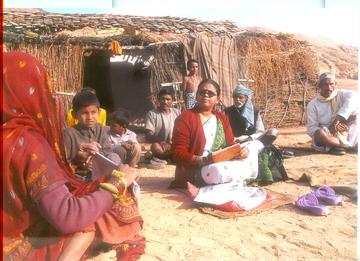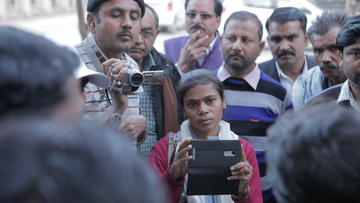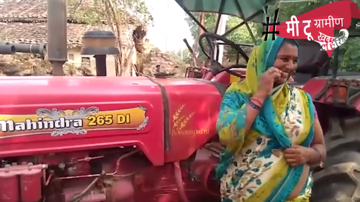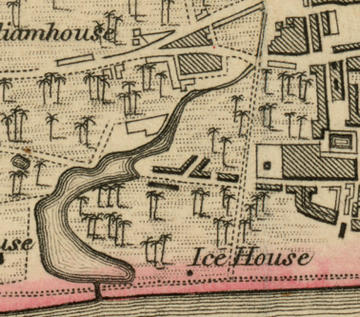लिंग, जाती, ज़मीन, और सत्ता: चुनौतियों भरा सशक्ततकरण का एक सफ़र
Gender, Caste, Land & Power: A Journey of Challenge and Empowerment
Introduction
In India, soon to be the most populous country in the world and its largest democracy, owning a piece of the earth under the sun is akin to a primal urge for survival.
It is as much an idea filled with romance as it is a practical act of affirmation of one’s life – giving meaning to one’s existence, lending purpose to one’s will. It is also inextricably linked with a claim to power. Our history is nothing if not a repeated and continuous succession of dynasties and emperors staking claim to territories – it is a blood-thirsty drive to power, an ambition to own more and more.
It is also, hence, unequivocally, male. Land, and related shenanigans to it, especially owning it, controlling it, is stuff of the man’s world alone.
It is no wonder then that the structural systems placed around the possession and security of land have been in favour of men.
As we all know, it was with the amendments made in the inheritance laws in India as recent as 2005 that daughters were granted equal receipt of property, as sons. It was also lauded, and rightly so, as an overdue recognition of equal rights in the legal sphere.
But we also know that changing or revising laws on paper can mean very little in actual fact. And on the ground, where power norms and socio-economic codes are intermeshed like a tensile spiderweb, it is virtually impossible for women to take a stab at taking a claim to land.
According to an index created by the Centre for Land Governance, only 6.1% of all land holdings are held by women in Uttar Pradesh. The national average is 12.9%.
This is the context and the theme that this presentation focusses on. We are looking at land ownership in the context of rural women, who are doubly marginalized in their identities as Dalit.
What are the complexities of this scenario?
What are the challenges?
And most importantly, through the tales of a few brave women, we look at what it means when women speak up in the most male of spaces, on the most male of topics.
We take head-on, the question and conundrum of empowerment. Two of these brave women, Meera & Shyamkali, are amongst us today, and will now be presenting their personal narratives.
Meera will also present a third narrative, that of Gayatri.
The Many Lives of Land, from this lens, presented by Meera & Shyamkali
My name is Meera

I have been a working woman for over 30 years my life – first in the area of social work, and then in the very exciting sphere of journalism, as a reporter and then an editor at Khabar Lahariya, India’s only feminist, grassroots news platform working out of the hinterland. I have been in Khabar Lahariya for over 18 years now.
I am an anomaly in the place I call home. This is because I am an educated, reputed Dalit social worker and journalist who is also a woman. But by accessing property rights – my entitled rights – I have been perhaps the biggest anomaly.
My brother and I were practically raised by my bua, my aunt who I have loved and doted on through my growing up years and beyond. As her sole caretaker, while also financially supporting my own family, I have been through hard times. But I supported my aunt because there was nobody else.
My bua has had no children of her own and the question of who would inherit the property she left behind, especially when she began battling with her health and started ageing, became a looming one, getting uglier by the day among my family – both immediate and extended.
As her sole caretaker, my aunt bequeathed it to me, but my struggles with claiming it as my own have been tremendous.
After years of processing and innumerable court rounds, I have finally got the land and the house officially transferred in my name. But the friction in the family has been immense. Everyone was of the opinion that a woman cannot be doing this – she cannot be going to the court so often, and she cannot be so hell-bent on having property in her name. I fought back tooth and nail. What is it about legalities that only men can understand? There is no such thing. I immersed myself in understanding the Indian legal system around inheritance – how it changes from centre to state, among other things.
I found the same discrepancies we find elsewhere. Such as in the much-feted Panchayati Raj system, where women’s participation is often showcased as respectable – indeed with a 33% reservation, how could it not be? But what happens in fact, on the ground?
All the authority that comes with being pradhan is the prerogative of the men in her life – her husband, her son, her father, her father-in-law. Women are simply told that they should take care of the children, the home, the family. But the concerns of the larger society, elections and politics? Leave that to us, the men say. What will you do running around trying to get it done?
Exactly what we are told in matter of land ownership too. Leave it to us.
But I leveraged my own stature and credibility in the local landscape, years of work that have got me to where I am today, to ensure that I do not leave anything to the men.
Today, the happiness I feel in having land in my name, a home in my name – mine and nobody else’s – is an unparalleled feeling, and one that I cannot put into words.
My name is Shyamkali

I am a neo-literate Dalit woman, and have been a reporting in Khabar Lahariya for the last nine years. Working in the world considered for men and men alone – that is, the outdoors, which is everything beyond the four walls of a home – opened me up in ways I had never experienced before.
But, in Mahoba, where I live and work, being a reporter is not what a woman does. My new lifestyle was not acceptable in my milieu. My in-laws would harass me, plague me with their taunts and abuses whenever they got a chance. Why do you need to speak with men? Why do you come back home late? What is it that you’re really doing outdoors?
The verbal abuses turned physical, and there were days I would go to work, bruised and battered, often to report on cases of violence against women.
I chose to stay quiet for very long. I would come home and look at the faces of my sons and decide it wasn’t worth it to say anything, to retaliate or fight back. I would cling onto the hope that one day my husband will realize that this is wrong and take me away.
But things only got worse. I filed reports and complaints, we all did many rounds of police stations and courts, but we would always come back with compensatory frames of mind. I would be back in the hell-hole that was my home.
My patience broke one day and I left them. I took my sons with me and I went back to my parents' home. My husband and his family demanded that I return the children – that as sons, they were their future – but I refused. I gave birth to them, I said, so if it’s about possession, then they’re as good as being mine.
After a few years of living this way, I had new fears. Or perhaps they were old ones. Our socio-cultural norms say that girls are ‘paraya dhan’, and they have no right over their parents or their parents’ assets once they are married. What if my own mother and father abandoned me someday?
These fears urged me to take a big decision: To buy my own piece of land, for myself.
I am one of a handful of Dalit women, to have done this, I know. As a single woman, who is barely literate, I have also faced extreme backlash. A woman gives birth but she is stripped of all rights in this land – isn’t it time we took these rights back? Took this land back?
Today, my piece of earth sits bereft. I don’t really have the money to work on it properly, to think of building a home or anything. My parents keep telling me to do so, so that they can die in peace, they insist.
I often wonder if I should consider going back to my husband’s home, to take what’s mine rightfully. I am after all, the mother of his sons – I can claim my stake on that. All I have to do is don the mangal sutra and wear some sindoor again, isn’t it? That’s all that the society will ask for.
Is it right to feel this way?
Is it better to try and build on my own land?
How do I navigate these very grey areas?
These are the questions that haunt me every single day.
Listen to the story of Gayatri kisan

Unlike Shyamkali and Meera, Gayatri has never seen the insides of an education system, no matter how informal. She is a farmer who as is wont to the plight of a woman farmer in India, did not have the status or the official recognition of being one.
When she lost her husband approximately a decade ago, she found herself pushed to the wall by the patriarchal system that was determined to put her in her place immediately. Her husband’s male relatives, which included his uncle and nephew, propositioned her in a bid to gain rights over the land that belonged to her husband, and to control her sexuality. “It was the question of quite a few acres of land”, she told the Khabar Lahariya team when we interviewed her as part of MeToo Rural, an ongoing special series documenting stories of violence against women at the workplace in rural and small-town geographies, “And of course the question of my gender and caste (Gayatri belongs to the chamar caste) were always central to it – the intended violence and the violence.”
According to the NSSO Land and Livestock Holding Survey (2013), the share of land owned in rural India by different social groups was 13.06% for Scheduled Tribe, 9.23% for Scheduled Caste, 45.68% for Other Backward Class and 32.03% for others.
The average area of land owned per household was 0.650 hectares for Scheduled Tribe, 0.272 hectares for Scheduled Caste, 0.603 hectares for Other Backward Class and 0.816 hectares for others. But the 2011 SECC does not segregate ownership data by gender.
In our so-called agriculture-centric nation, the status and recognition of a farmer is limited to the men. In U.P. itself, 90% of women continue to execute all the heavy-lifting associated with farming – from ploughing, planting, harvesting, and storing the produce to transporting it to the markets and mandis for estimates and sales and selling – and yet both the financial gains and the status of the farmer is given to their male relatives. This is, simply put, because the land is not in her name.
This is the many-headed system that Gayatri chose to fight, indeed continues to battle even today. The threats of sexual violence, the repeated attempts to thwart her decisions around keeping the land, and registering it officially under her name, have been unending. “I worked for this, non-stop for five years,” she shared, “I appealed to everyone from the lehpal, the pradhan, the tehsildar, to the lawyer and the SDM and I did not give up. They would keep shooing me away, calling me chamar, calling me aurat, calling me illiterate, but I kept going back. The journeys to the administration, the tedium and circularity of the paperwork, I did them all.”
Meera & Shyamkali
Khabar Lahariya
References
- https://www.indiaspend.com/lakshadweep-meghalaya-have-most-women-land-holders-punjab-west-bengal-fewest-54024/
- http://mospi.nic.in/sites/default/files/publication_reports/Report_571_15dec15_ 2.pdf
- https://secc.gov.in/categorywiseHouseOwnershipStatusReport?reportType=Female%20Headed%20Category#
- https://www.youtube.com/watch?v=v9-vfMrhz6Q
- https://khabarlahariya.org/woman-farmer-double-hell/




